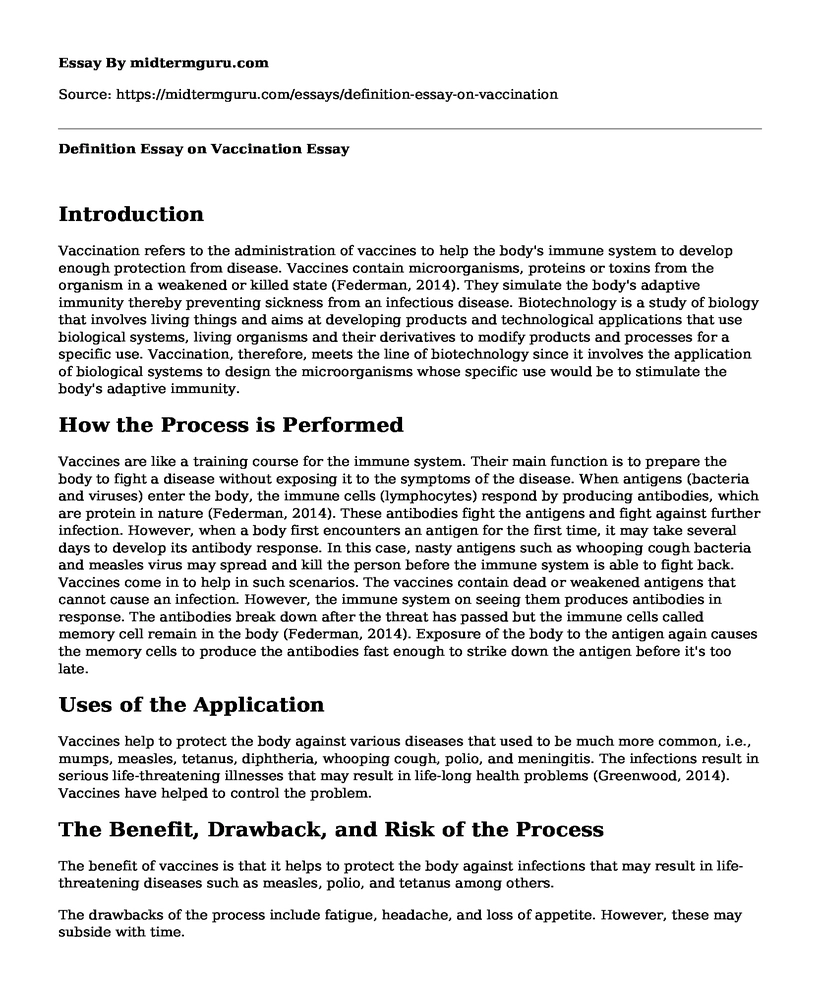Introduction
Vaccination refers to the administration of vaccines to help the body's immune system to develop enough protection from disease. Vaccines contain microorganisms, proteins or toxins from the organism in a weakened or killed state (Federman, 2014). They simulate the body's adaptive immunity thereby preventing sickness from an infectious disease. Biotechnology is a study of biology that involves living things and aims at developing products and technological applications that use biological systems, living organisms and their derivatives to modify products and processes for a specific use. Vaccination, therefore, meets the line of biotechnology since it involves the application of biological systems to design the microorganisms whose specific use would be to stimulate the body's adaptive immunity.
How the Process is Performed
Vaccines are like a training course for the immune system. Their main function is to prepare the body to fight a disease without exposing it to the symptoms of the disease. When antigens (bacteria and viruses) enter the body, the immune cells (lymphocytes) respond by producing antibodies, which are protein in nature (Federman, 2014). These antibodies fight the antigens and fight against further infection. However, when a body first encounters an antigen for the first time, it may take several days to develop its antibody response. In this case, nasty antigens such as whooping cough bacteria and measles virus may spread and kill the person before the immune system is able to fight back. Vaccines come in to help in such scenarios. The vaccines contain dead or weakened antigens that cannot cause an infection. However, the immune system on seeing them produces antibodies in response. The antibodies break down after the threat has passed but the immune cells called memory cell remain in the body (Federman, 2014). Exposure of the body to the antigen again causes the memory cells to produce the antibodies fast enough to strike down the antigen before it's too late.
Uses of the Application
Vaccines help to protect the body against various diseases that used to be much more common, i.e., mumps, measles, tetanus, diphtheria, whooping cough, polio, and meningitis. The infections result in serious life-threatening illnesses that may result in life-long health problems (Greenwood, 2014). Vaccines have helped to control the problem.
The Benefit, Drawback, and Risk of the Process
The benefit of vaccines is that it helps to protect the body against infections that may result in life-threatening diseases such as measles, polio, and tetanus among others.
The drawbacks of the process include fatigue, headache, and loss of appetite. However, these may subside with time.
The risks associated with vaccines include allergic reactions immediately after vaccination, that may result in itching of the body and anaphylactic reactions that may result in breathing difficulties and even collapse in some cases (Greenwood, 2014). However, these incidences are rare.
Ethical Concern of Vaccines
An ethical concern for vaccines resonates around the research and testing of vaccines, including their development, population, study design and trial location (Moodley, 2012). For a vaccine to be licensed, it goes through many years of research and passes rigorous safety and efficacy standards. Moreover, the development and research processes include diverse expert thoughts form many scientific and social disciplines that include public health, immunology, epidemiology and statistics from pharmaceutical companies. These stakeholders may also contain conflicting motives and priorities that may contribute to various ethical discussions (Moodley, 2012). To test the effectiveness of a vaccine, a clinical trial group that includes a control group that does not get the test vaccine is usually vital.
References
Federman, R. (2014). Understanding Vaccines: A Public Imperative. The Yale Journal Of Biology And Medicine, 87(4), 417. Retrieved from https://www.ncbi.nlm.nih.gov/pmc/articles/PMC4257029/
Greenwood, B. (2014). The contribution of vaccination to global health: past, present, and future. Philosophical Transactions Of The Royal Society B: Biological Sciences, 369(1645), 20130433-20130433. doi:10.1098/rstb.2013.0433
Moodley, K. et al (2012). WHO | Ethical considerations for vaccination programmes in acute humanitarian emergencies. Who.int. Retrieved 13 March 2019, from https://www.who.int/bulletin/volumes/91/4/12-113480/en/
Cite this page
Definition Essay on Vaccination . (2022, Sep 12). Retrieved from https://midtermguru.com/essays/definition-essay-on-vaccination
If you are the original author of this essay and no longer wish to have it published on the midtermguru.com website, please click below to request its removal:
- Essay on Healing Hospital Environment
- Essay on Predicting Hospital Readmission Risk
- Annotated Bibliography on the Relationship Between Single Mothers and Poverty
- Paper Example on Fat and Protein Consumption
- Essay Sample on Breast Cancer and Prostate Cancer Disorders
- Memory, Learning, Creativity and Intelligence Interrelation - Essay Sample
- PEN-3 Model: A Comprehensive Approach to Health Challenges - Essay Sample







